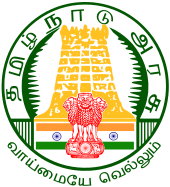Tamil Nadu legislative assembly
| Tamil Nadu Legislative Assembly | |
|---|---|
| 15th Legislative Assembly | |
 |
|
| Type | |
| Type | |
| Leadership | |
| Structure | |
| Seats | 235 (234 Elected + 1 Nominated) |
 |
|
|
Political groups
|
AIADMK EKPS Camp (124) |
| Elections | |
| First-past-the-post | |
|
Last election
|
16 May 2016 |
| Meeting place | |
 |
|
| Fort St. George 13°04′54″N 80°17′09″E / 13.081539°N 80.285718°ECoordinates: 13°04′54″N 80°17′09″E / 13.081539°N 80.285718°E | |
| Website | |
| www |
|
| Footnotes | |
| The Assembly was established in 1937 for the Madras Presidency. The Presidency became Madras State in the Republic of India in 1950; Madras State in its current state was formed in 1956 and renamed as Tamil Nadu on 14 January 1969 | |
AIADMK EKPS Camp (124)
AIADMK OPS Camp (11)
The Tamil Nadu Legislative Assembly alone has powers to legislate laws covering state subjects in the Indian state of Tamil Nadu. It has a strength of 235 members of whom 234 are democratically elected using the First-past-the-post system. The remaining member is nominated as a representative of the Anglo Indian community. The presiding officer of the Assembly is called the Speaker. The term of the Assembly is five years unless it is dissolved earlier.
Since Tamil Nadu has a unicameral legislature, the term Tamil Nadu Legislature and Tamil Nadu Legislative Assembly are almost synonymous and are often confused. However they are not one and the same. The Tamil Nadu Legislature is the legislative body while the Tamil Nadu Legislative Assembly is a part of it. The Tamil Nadu Legislative Assembly along with the Governor of Tamil Nadu, constitutes the Tamil Nadu Legislature.
The present State of Tamil Nadu is a residuary part of the erstwhile Madras Presidency and was formerly known as Madras State. The first legislature of any sort for the Presidency was the Madras Legislative Council which was set up as a non-representative advisory body in 1861. In 1919, direct elections were introduced with the introduction of Diarchy under the Government of India Act of 1919. Between 1920-1937, the Legislative Council was an unicameral legislature for the Madras Presidency. The Government of India Act of 1935 abolished dyarchy and created a bicameral legislature in the Madras Presidency. The Legislative Assembly became the Lower House of the Presidency.
...
Wikipedia
